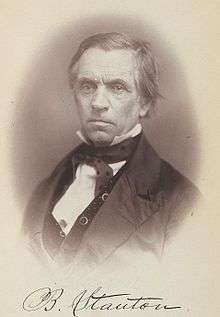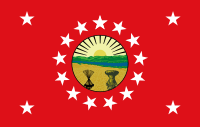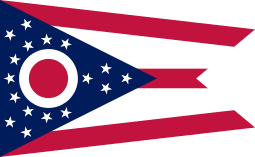Benjamin Stanton
| Benjamin Stanton | |
|---|---|
 | |
| Member of the U.S. House of Representatives from Ohio's 4th district | |
|
In office March 4, 1851 – March 3, 1853 | |
| Preceded by | Moses Bledso Corwin |
| Succeeded by | Matthias H. Nichols |
| Member of the U.S. House of Representatives from Ohio's 8th district | |
|
In office March 4, 1855 – March 3, 1861 | |
| Preceded by | Moses Bledso Corwin |
| Succeeded by | Samuel Shellabarger |
| 6th Lieutenant Governor of Ohio | |
|
In office January 13, 1862 – January 11, 1864 | |
| Governor | David Tod |
| Preceded by | Robert C. Kirk |
| Succeeded by | Charles Anderson |
| Member of the Ohio Senate from the Champaign, Logan and Union Counties district | |
|
In office December 6, 1841 – December 3, 1843 | |
| Preceded by | Dowty Utter |
| Succeeded by | John Gabriel, Jr. |
| Personal details | |
| Born |
June 4, 1809 Mount Pleasant, Ohio |
| Died |
June 2, 1872 (aged 62) Wheeling, West Virginia |
| Resting place | Greenwood Cemetery |
| Political party | Whig, Opposition, Republican |
Benjamin Stanton (June 4, 1809 – June 2, 1872) was an American politician who served as sixth Lieutenant Governor of Ohio from 1862 to 1864.
Biography
Born in Mount Pleasant, Ohio, Stanton pursued academic studies, and learned the tailor's trade. Stanton studied law and was admitted to the bar in 1834, and began practicing law in Bellefontaine, Ohio.
Career
Stanton served as a member of the Ohio Senate from 1841 to 1843, and as delegate to the state constitutional convention in 1850.
Stanton was elected as a U.S. Representative from Ohio twice. He served as a Whig to the Thirty-second Congress, from 1851 to 1853.
From 1855 to 1861, he served as an Opposition Party candidate to the Thirty-fourth Congress and reelected as a Republican to the Thirty-fifth and Thirty-sixth Congresses. Stanton served as chairman of the Committee on Military Affairs (Thirty-sixth Congress).
Stanton served as lieutenant governor of Ohio in 1862, during the American Civil War. After the battle of Shiloh, in April 1862, at Pittsburg Landing, Tennessee, Stanton visited the Union Army and soon published a statement critical of the Union generals. He opined that Ulysses S. Grant and Benjamin M. Prentiss, both appointed from Illinois, should be court-martialed and shot. General William Tecumseh Sherman, appointed from Ohio, published a sharp rebuttal. This led to Stanton's criticizing Sherman as well.
Stanton moved to Martinsburg, West Virginia, in 1865, and practiced law. He moved to Wheeling, West Virginia, in 1867 and continued the practice of law.
Death
Stanton died in Wheeling on June 2, 1872, and was interred in Greenwood Cemetery in Wheeling, West Virginia.[1]
References
- ↑ "Benjamin Stanton". Find A Grave. Retrieved August 5, 2012.
External links
| Wikiquote has quotations related to: Benjamin Stanton |
- United States Congress. "Benjamin Stanton (id: S000801)". Biographical Directory of the United States Congress.
- Benjamin Stanton at Find a Grave
![]() This article incorporates public domain material from the Biographical Directory of the United States Congress website http://bioguide.congress.gov.
This article incorporates public domain material from the Biographical Directory of the United States Congress website http://bioguide.congress.gov.
| United States House of Representatives | ||
|---|---|---|
| Preceded by Moses B. Corwin |
Member of the U.S. House of Representatives from Ohio's 4th congressional district 1851-1853 |
Succeeded by Matthias H. Nichols |
| Preceded by Moses B. Corwin |
Member of the U.S. House of Representatives from Ohio's 8th congressional district 1855-1861 |
Succeeded by Samuel Shellabarger |
| Political offices | ||
| Preceded by Rutherford B. Hayes |
Lieutenant Governor of Ohio 1862-1864 |
Succeeded by Richard M. Bishop |


